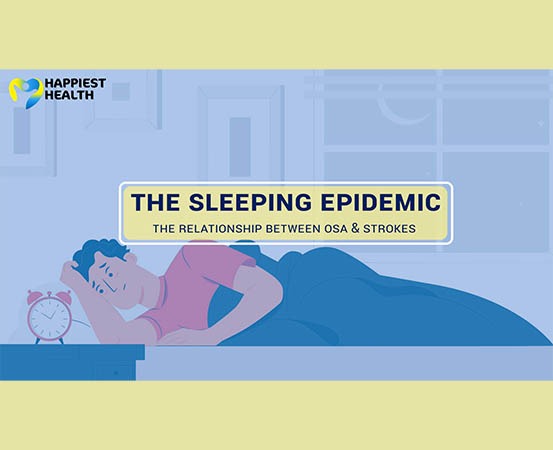
Snoring, feeling drowsy all day and not getting proper rest at night can be signs of obstructive sleep apnea (OSA) — a condition where breathing slows down or stops repeatedly during sleep. Experts call it a hidden epidemic, stating that majority of the population with this condition are highly susceptible to strokes. Recurrent episodes of disrupted breathing can cause hypoxia (insufficient oxygen to perform bodily functions) in the brain. This can trigger plaque buildup in the arteries and the formation of blood clots over time, eventually leading to a stroke. Cautioning about the signs of OSA, experts emphasize the importance of certain lifestyle modifications to manage the condition, which in turn will considerably reduce the likelihood of strokes.
The link between OSA and strokes
Dr Vikram Huded, senior consultant, interventional neurologist and head of neurology, Narayana Health Institute of Neurosciences, Bangalore, highlights a concerning statistic, stating, “About 70–80% of people who experience a stroke have obstructive sleep apnea (OSA).” When someone has OSA, obstruction of the upper airway leads to hypopnea (a period of shallow, restricted breathing lasting 10 seconds or more). This disturbs sleep and causes fatigue during the day. Those with OSA also tend to have brief periods of wakefulness, referred to as micro-arousals. Frequent episodes of slowed or stopped breathing can decrease the oxygen levels in the body. When the brain doesn’t receive enough oxygen, it triggers wakefulness. “This not only disturbs sleep, but also leads to diabetes and makes one highly susceptible to cardiovascular complications and strokes,” explains Dr Huded.
Dr Satish K S, senior pulmonologist and president of the Karnataka Pulmonologists Association in Bangalore, says OSA can cause irregular or rapid heartbeats (atrial fibrillation). Some people even fall asleep while cycling or driving, increasing the risk of accidents. Other causes of stroke include constriction in the small blood vessels in the brain or an increase in the rate of atherosclerosis (hardening and narrowing of your arteries caused by plaque buildup that blocks blood flow), he adds.
According to Dr Huded, the types of strokes that OSA can cause include: large vessel occlusion (blockage in the large, proximal cerebral arteries), lacunar stroke (stroke in the deeper areas of the brain), arrhythmia-related stroke (stroke occurring due to irregular heartbeat) and cardiometabolic stroke (stroke caused by metabolic or cardiovascular conditions).
How is OSA caused?
According to experts, the primary causes of OSA include:
- Obesity
- Hypothyroidism (a condition where the thyroid doesn’t produce enough hormones)
- Hypertension
- Diabetes
- ENT issues like a deviated nasal septum
- Facial abnormalities like a small or retracted jaw
- Enlarged adenoids and tonsils (in children)
Drawing attention to the correlation between OSA and severe hypertension, Dr Satish cautions, “People, especially those who are overweight, may unknowingly be walking on thin ice towards a stroke.”
Symptoms of OSA
According to Dr Satish, OSA can manifest in various ways. Some of the early markers of the condition are:
- Loud snoring
- Not feeling refreshed after waking up in the morning
- Persistent drowsiness throughout the day
- Frequent dozing off during office hours
- Lack of concentration
- Increased frequency of urination
- Impotence
- Memory loss
- Depression
How to manage OSA?
Addressing OSA necessitates lifestyle modifications that extend beyond sleep hygiene. Sleep apnea can occur regardless of one’s age. Even individuals in their late 20s or 30s can encounter OSA owing to a sedentary lifestyle. So, getting screened is the first step. Some measures that can be taken to manage OSA include:
♦ Healthy lifestyle
Leading a healthy and active lifestyle, incorporating yoga and pranayama, can contribute positively to preventing sleep apnea and boosting overall well-being, say experts. Serious lifestyle modifications, such as limiting alcohol intake, are crucial in preventing strokes associated with OSA.
♦ Weight management
Dr Satish advocates for weight management. Obesity significantly contributes to airway obstruction, making weight loss a crucial element in the prevention strategy. He underscores, “Exercise and diet are paramount.” While lifestyle changes are instrumental, severe cases might require interventions like geriatric surgery.
♦ Oropharyngeal exercises
Oropharyngeal exercises, including tongue stretches, gum chewing, facial exercises and nasal breathing, are aimed at enhancing tongue and pharyngeal movement. This can prove beneficial in managing OSA.
♦ Sleep apnea machines
Those who have already experienced a stroke or have been diagnosed with OSA should undergo regular screening and consider sleep apnea machines (CPAP and BiPAP) for uninterrupted sleep, advises Dr Satish.
Takeaways
- OSA is linked to strokes, with 70–80% of individuals who have experienced a stroke showing signs of OSA.
- Early symptoms of OSA include loud snoring, daytime sleepiness and reduced concentration. This can cause one to fall asleep while driving, increasing the risk of accidents.
- Causes of OSA include obesity, hypothyroidism, hypertension and diabetes.
- Lifestyle modifications like regular exercise and a healthy diet will play a crucial role in preventing strokes associated with OSA. Sleep apnea machines can also help.

















